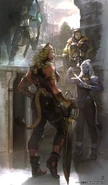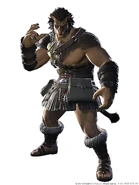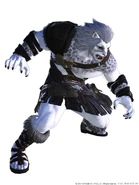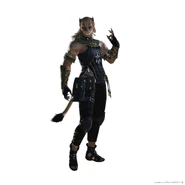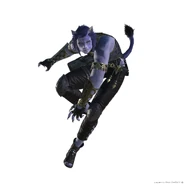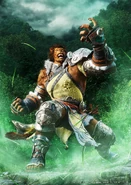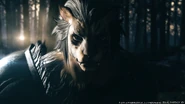The Hrothgar is a feline race from Ilsabard and Tural in Final Fantasy XIV, making their debut the Final Fantasy XIV: Shadowbringers expansion alongside the Viera. Though similar to the Miqo'te, their appearance is more animalistic and burly.
They are known as Xbr’aal in Tural and Ronso in the First. In Final Fantasy Lost Stranger, they are known as Ronga.
Culture[]
The Hrothgar have no particular clan distinction but are observed externally as having two separated into two clans, the Helion and the Lost. In ages past, the Helions of southern Ilsabard served under a singular matriarchal rule, their lives revolving around their queen.
By contrast, the Lost are a nomadic clan known to undertake many trade professions, from peddlers to mercenaries. They're hesitant to take up occupations that restrict their traveling. Their cold fur is said to be a symbol of their independent nature, driving them away from the warm embrace of their queen.
The Gunbreaker job originates with the Hrothgar, who have passed the art of the gunblade from generation to generation. Originally employed by Queen Gunnhildr's personal guard, the weapon combines a sword with a firing mechanism, emitting a range of magical effects by utilizing aetherically imbued cartridges.
Story[]
Hailing from the distant shores of Ilsabard, the Hrothgar are a burly people of leonine appearance. Females are staggeringly few among their population and are rarely glimpsed by the other races.
The Hrothgar's imposing countenance, not mitigated by their sharp claws and their still sharper fangs, incited panic among Eorzeans upon their arrival. As they were unable to communicate, initial interactions among the commonfolk often escalated into conflict. After the Hrothgar gained mastery over the common tongue fears allayed and, in time, they were welcome in all corners of the realm.[1]
Hrothgar also make their homes in Tural, where they are known as Xbr'aal. They live in the highland areas of Yak T'el and had a history of conflict with the Mamool Ja of the lowlands, before all the peoples of Tural were united by Gulool Ja Ja eighty years ago.
Differences from the other races[]
Initially, Hrothgar could not choose hairstyles, as they were tied to the Face option, though the aspects could be customized more freely, such as locks and fringes. Following 6.1 however, Hrothgar can freely change their hairstyles with the face-specific ones functioning similarly to the horn styles of the Au Ra. Their fur patterns can also show up on their tail and the length of their canines can be adjusted. Initially, headgear was invisible on the Hrothgar's model due to their unique shape, but after feedback, the development team made adjustments so that some would appear, such as glasses, visors, and circlets, as well as a few helmets and masks.
While male Hrothgar share similar aspects with the male Roegadyn, such as sharing the same Lancer and Marauder idle animations, their hunched-back appearance gives them slightly tweaked animations to cause them to lean slightly forward when wielding weapons that usually have others stand up straight.
Attribute modifiers[]
The following table shows the attribute modifiers for Hrothgar. These are flat modifiers and do not scale with level, only making a noticeable difference at low levels and very quickly becoming negligible as these attributes climb into the hundreds and thousands. Hrothgar are notable for having the most extreme modifiers, with all of their attributes being increased or decreased by the maximum of 3. They are also the only race to have the same modifiers in both their clans.
| Clan | STR | DEX | VIT | INT | MND |
|---|---|---|---|---|---|
| Helions | 3 | -3 | 3 | -3 | 3 |
| The Lost | 3 | -3 | 3 | -3 | 3 |
Naming conventions[]
Hrothgar forenames are based on old Slavic names, though the word "glory" in Hrothgar is "thgar" instead of slav.
Due to the unique nature of the "clan" conventions of the Hrothgar, their names were sorted by social status by scholars of other races rather than a native invention.
Male Helion surnames are based on the queen they served as, the "clans" named by scholars after the way their lives revolve around their queen, much like celestial bodies to a sun. Helion queens themselves are given the letter A as a prefix, meaning "in service of". If their queen is alive at the time of their birth or still living as acting queen, their name is to be prefixed with A. Examples include
- Amira
- Azora
- Avesna
- Azorya
- Astana
As Lost do not serve a matriarch, their surnames are given the suffix "sch" meaning lost, replacing the prefix A used for Helions. Examples include
- Zlatasch
- Liubasch
- Brankasch
- Tirasch
- Ratyasch
Behind the scenes[]
The Hrothgar were revealed as a second playable race alongside the Viera during the Final Fantasy XIV Fan Festival in Tokyo in March 2019 for the Shadowbringers expansion. As a counterpart of the female-only Viera, the Hrothgar would be genderlocked as a male-only race, though like the Viera, the opposite sex exists for lore reasons, but are rarely seen. The Hrothgar were added due to fan request to have the option to choose a more bestial race amidst the various humanoid options. While beastmen races were in the game since Legacy, they were mostly relegated to antagonistic NPC roles due to lore reasons. Due to resource and time constraints, both Viera and Hrothgar were genderlocked to make room for both, as they were meant to be the last two races added to the game, taking into consideration the amount of work it takes to create a new playable race with their unique customization options and animations, as well as having to modify hundreds of individual pieces of gear to fit their unique models. The decision was met with mixed reactions, but producer-director Naoki Yoshida did not entirely rule out the possibility of adding in the opposing genders later down the line.
In the Final Fantasy XIV 2021 Fan Festival, the male Viera were unveiled as a playable option. but female Hrothgar, although also confirmed, were said still be in development and would be released some time after Endwalker's initial launch. Concept art of a Hrothgar Queen Gunhildr can be found in the Art of Reflections artbook.
Female Hrothgar first appeared in-game with patch 6.5, Growing Light, which featured a Xbr’aal NPC seen only from the waist down. Extraction of the model revealed that the model itself was limited to this area, being a pair of legs with unique animations. Playable female Hrothgar were introduced in Dawntrail.
According to Naoki Yoshida during the Live Letter before Endwalker, the reason the for the hairstyles being tied to the faces was simply because the dev team felt that the hairstyles should more fit their facial features. In spite of this, a few Hrothgar in Gangos can be found with hair and face combinations inaccessible to the player as well as one of the first in-game renders of the race. While new hairstyles were implemented in Patch 6.1, they were met with much criticism as the new hairstyles culled the model's ears. As of Patch 6.2, this issue has been rectified, adding small tufts of hair/fur where the ears would normally poke out.
The Hrothgar are primarily based on the Ronso from Final Fantasy X and are named as such in the First. Due to limitations, the Hrothgar's fur is mostly short and relegated to tufts of fur covering their limbs and collarbone.
The distinction of Hellion and Lost is intended to be a gameplay distinction for player expression and options, and is not matched by most Hrothgar NPCs in the game. This is the reason why, despite the Helions being described as loyal to the Queen, the Bozjan Resistance's Hrothgar membership is made up mostly of Lost clan members.
Gallery[]
Etymology[]
The name Hrothgar is derived from the Old English personal name Hrōðgār, composed of two elements *hrōþiz (praise, fame, glory, renown, honor) and *gaizaz (spear, pike, javelin). It can be translated as "glorious spearman" or "famous with the spear". Hrothgar was also the name of a semi-legendary Danish king, who features prominently in the Anglo-Saxon epic poem Beowulf. The name is also ultimately the origin of the real-world given name Roger.

